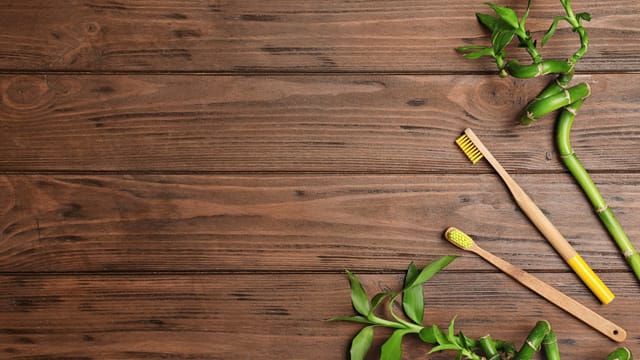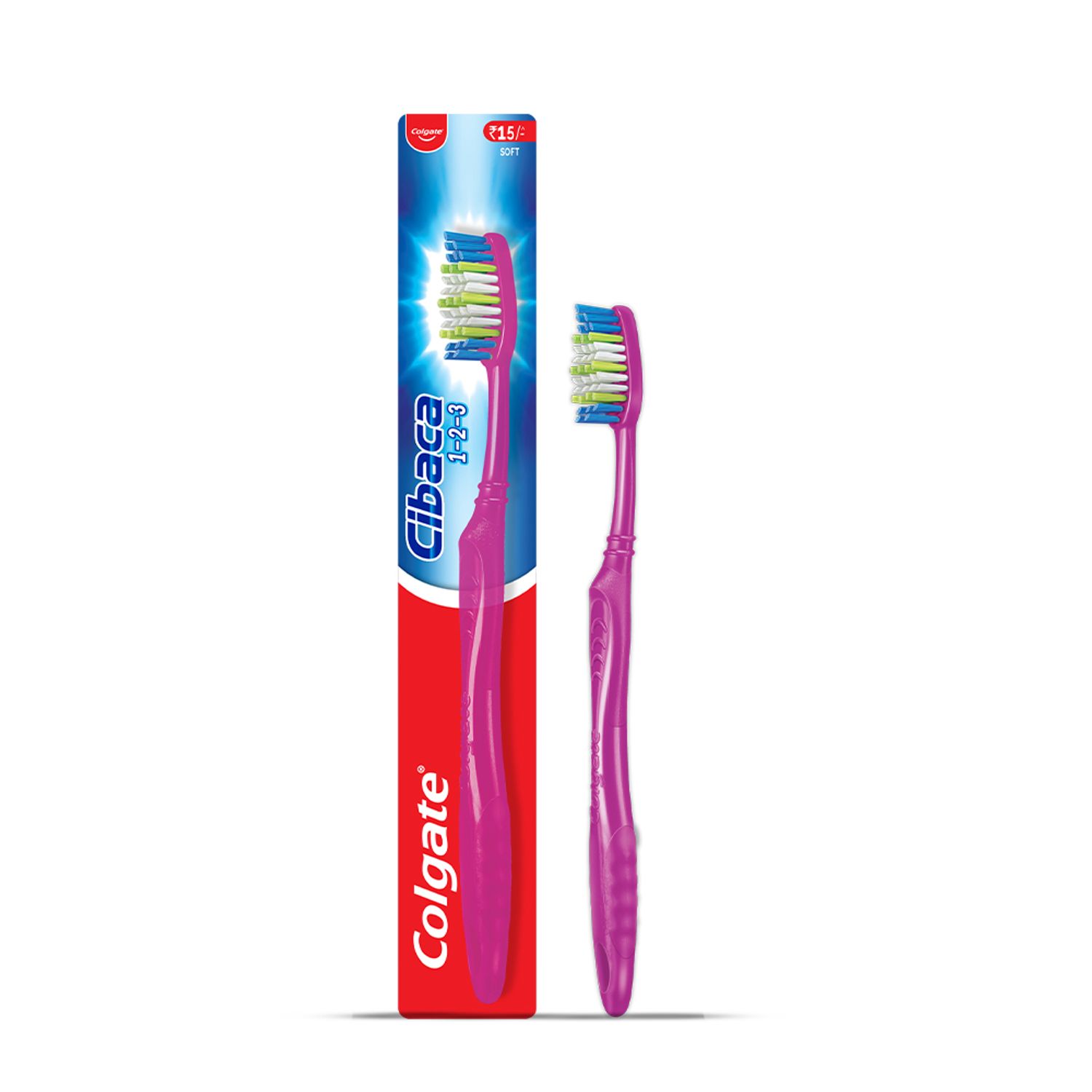Continue reading to learn more about what makes bamboo toothbrushes different from traditional plastic toothbrushes, how they help the environment, and whether they are a good option for your oral care routine. You may also find the answer to whether bamboo toothbrushes will clean your teeth as effectively as plastic ones.
What is a Bamboo Toothbrush?
A bamboo toothbrush is a type of toothbrush that has a handle made from bamboo, often considered an environmentally sustainable timber. Unlike regular toothbrushes, which are usually made of plastic, bamboo toothbrushes are more eco-friendly as bamboo is biodegradable. Most bamboo toothbrushes have bristles made from nylon; others may also have bristles infused with activated charcoal, which may help whiten teeth.
The bamboo handle is what makes these toothbrushes different and a popular choice for people looking to reduce their use of plastic. Although bamboo toothbrushes may seem like a new, eco-friendly option, they are actually one of the oldest types of toothbrushes.
Oral Health Benefits of Bamboo Toothbrushes
Switching to an eco-friendly bamboo toothbrush offers several benefits not only for the environment but also for your oral health. Let us look at some of the key bamboo toothbrush benefits:
Effective Cleaning
When it comes to cleaning, bamboo toothbrushes offer effective cleaning, just as traditional plastic toothbrushes. The soft bristles of a bamboo brush, usually made of nylon or other materials, help with the removal of plaque and food particles from your teeth. It could, in turn, help in preventing cavities and gum disease. You may continue brushing twice daily as you would with a regular toothbrush to ensure proper oral care.
Naturally Antibacterial
One of the unique benefits of organic bamboo toothbrushes is that they have natural antibacterial properties. This means that bacteria are less likely to grow on the handle of your toothbrush compared to plastic ones. While this does not replace regular cleaning of your toothbrush, it can offer an extra layer of protection, keeping your toothbrush fresher for longer. This can be especially helpful in reducing the growth of harmful bacteria in the mouth, promoting improved oral health.
Gentle on Gums
When you brush with bamboo toothbrush, the soft bristles offer a gentle cleaning on the gums, making it a great choice for people with gum irritation and sensitivity. Unlike some plastic toothbrushes, which have hard bristles, bamboo toothbrushes usually have soft bristles, which offer a comfortable brushing experience without causing any discomfort or irritation, especially for people with gum disease or receding gums.
Environmental Advantages of Bamboo Toothbrushes
One of the biggest reasons most people are switching to bamboo toothbrushes is their positive environmental impact. Below are some of the advantages of bamboo toothbrushes, because of which it is considered to help protect the planet.
If you are in search of a toothbrush with 150% more ultra-soft, tapered bristles for a comfortable brushing experience, consider trying the Colgate Gentle Enamel Toothbrush. This toothbrush, designed with extra-soft bristles, offers gentle and effective cleaning while protecting your enamel. Its wide brush head and dual-layer bristle design allow for enhanced coverage, providing thorough cleaning while being gentle on your enamel and gums.
Biodegradable And Sustainable Material
Bamboo toothbrushes are often considered more eco-friendly because they are biodegradable and plastic free. Unlike single-use plastic toothbrushes, these organic toothbrushes break down over time and return to the soil as natural material. Bamboo’s rapid growth in India makes it a renewable resource, and its use as a toothbrush handle is a more sustainable option than plastic. The production process of bamboo toothbrushes also tends to have a lower environmental impact compared to plastic ones and thus greatly contributes to the zero-waste movement.
Reduced Plastic Waste
Usage of traditional plastic toothbrushes can greatly contribute to plastic waste accumulation, with a lot of it ending up in landfills every year. Bamboo toothbrushes, on the other hand, degrade naturally, leaving behind no lasting impact. While the bristles are often made from nylon and still need proper disposal, using a bamboo-handled biodegradable toothbrush can dramatically reduce overall plastic waste. You can compost the handles of bamboo toothbrushes if you first remove the nylon bristles. You can also find ways to creatively reuse the toothbrush handles, such as turning them into plant markers for your garden.
Bamboo Toothbrushes vs. Traditional Toothbrushes
If you are still confused about choosing bamboo toothbrushes over traditional toothbrushes, here is a quick comparison between plastic vs bamboo toothbrush.
Environmental Impact: Compared to traditional toothbrushes, bamboo toothbrushes have compostable handles made from natural bamboo, making them more eco-friendly.
Materials Used: Plastic toothbrushes are made with petroleum-based materials, while bamboo toothbrushes use plant-based, renewable resources. Bamboo toothbrushes are often available with BPA-free soft nylon bristles and may also feature charcoal-infused bristles.
Durability: Bamboo handles are biodegradable but need proper care to avoid water damage. In comparison, plastic toothbrush handles are more durable in wet conditions, but they lack the environmental benefits of bamboo.
Aesthetic and Feel: Bamboo toothbrushes usually have a natural look and feel when compared to bright-coloured plastic toothbrushes. The wood toothbrush has a smooth and earthy texture, which gives it a different feel from conventional plastic designs.
Affordability: Bamboo toothbrushes are often available at a regular price similar to that of plastic toothbrushes, making them an accessible option for consumers. Additionally, they may sometimes be available at a sale price lower than the original price, making them a budget-friendly option.
Travel-friendly: Many bamboo toothbrushes have travel cases, making it easy to take a high-quality, earth-friendly toothbrush on the go. Similarly, traditional plastic toothbrushes also often have travel options, though bamboo toothbrushes add the benefit of being a sustainable choice even when travelling.
How to Care For Your Bamboo Toothbrush?
When switching from a plastic toothbrush to a bamboo one, it is common to wonder whether it requires special care to remain in good shape. You can use a toothbrush with a bamboo handle the same way you would use a plastic toothbrush and should keep the same considerations in mind. When choosing your toothbrush, pay close attention to the size of the head, the shape of the handle, and the type of bristles. Ideally, you will want to choose a brush with soft bristles and with a brush head that fits comfortably in your mouth.
Many people just use their toothbrush in the morning, keep it in a cup or holder, and then do not think about it again until the night when it is time to brush. When it comes to taking care of our bamboo toothbrush, here are some tips to follow:
Store in a dry place: Always store your bamboo wooden toothbrush in a dry area and avoid leaving it in wet or closed containers. Some bamboo toothbrushes come with an upright toothbrush holder as a combo pack, which allows it to dry quickly.
Rinse thoroughly after use: Rinse your toothbrush to remove excess toothpaste and food particles. This helps to keep both the bristles and the bamboo handle clean.
Avoid prolonged water exposure: Prolonged exposure to water can cause the wooden handle to weaken or crack. You may use a clean towel to remove excess water from your toothbrush.
Replace at the right time: Like any other toothbrush, a bamboo toothbrush should be replaced every 3 months or when the bristles show signs of wear.
Choosing a bamboo toothbrush can be a simple yet impactful way to reduce plastic waste and a sustainable choice for both your oral health and the environment. These eco-friendly brushes offer effective cleaning and gentle care for your gums and have a naturally antibacterial handle, all while being biodegradable. While they require a bit of extra care, bamboo toothbrushes stand as an alternative to traditional plastic ones and have become a great choice for personal care. However, if you still have doubts about switching to a bamboo toothbrush, consult your dental professional to get personalised advice.
Frequently Asked Questions
1. How long should you use a bamboo toothbrush?
You may replace your bamboo toothbrush every 3 months or when the bristles start to fray. Timely replacement of your toothbrush helps you to ensure better dental cleaning and maintains good oral health.
2. Can I use a bamboo brush everyday?
Yes, you can use a bamboo toothbrush to brush your teeth every day. However, if you have questions about switching to a bamboo toothbrush, talk to your dentist. They can help you choose the toothbrush that is best for you and make other recommendations that will keep your mouth healthy while looking out for the planet.
3. Can I soak my bamboo brush in water?
No, it is best to avoid soaking your bamboo brush in water, as it can cause the bamboo handle to swell or crack. Instead, try to clean just the bristles and the handle with as little water as possible.
4. What are the bristles on bamboo toothbrushes made of?
If you are wondering what are the bristles on bamboo toothbrushes made of, they are typically made of nylon, which is durable and effective for cleaning teeth. Some bamboo toothbrushes also have bristles infused with activated charcoal, which can help with whitening and antibacterial properties.
This article is intended to promote understanding of and knowledge about general oral health topics. It is not intended to be a substitute for professional advice, diagnosis or treatment. Always seek the advice of your dentist or other qualified healthcare provider with any questions you may have regarding a medical condition or treatment.
ORAL HEALTH QUIZ
What's behind your smile?
Take our Oral Health assessment to get the most from your oral care routine
ORAL HEALTH QUIZ
What's behind your smile?
Take our Oral Health assessment to get the most from your oral care routine













